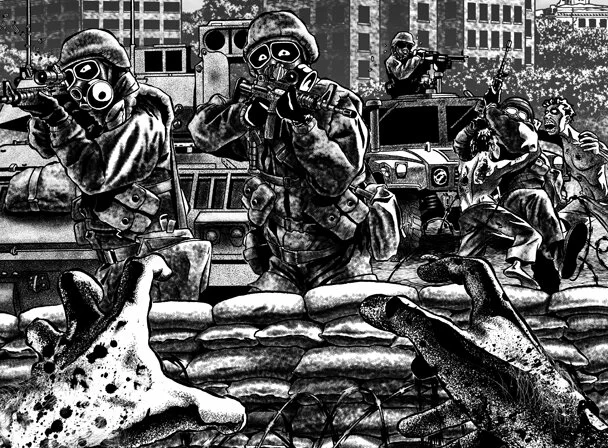 World War Z by the infamous zombie author Max Brooks delves deep into a nightmarish scenario of a world engulfed in war with the undead. The book is written in the style of Studs Terkel's The Good War. The entire story is told through interviews with people involved in the war in different places and times. The interviews all take place after the war has happened.
World War Z by the infamous zombie author Max Brooks delves deep into a nightmarish scenario of a world engulfed in war with the undead. The book is written in the style of Studs Terkel's The Good War. The entire story is told through interviews with people involved in the war in different places and times. The interviews all take place after the war has happened.This seems to be a mindless horror fiction book, but many underlying messages and themes can be found early on. As the stories of the interviewed are told, we see more and more about the panic, the chaos, and the sheer hopelessness of their situations. If anything, the entire book is a hypothetical account of what would occur if the world faced a major crisis.
Skepticism at the undead is the main focal point for the first section of the book, easily shown by the people who were there. From an former intelligence agent, this is infused with political commentary:
No matter how unlikely or far-fetched a possibility might be, one must always dig deeper. If a neighbor's nuclear power plant might be used to make weapons-grade plutonium, you dig; if a dictator was rumored to be building a cannon so big it could fire anthrax shells across whole countries, you dig; and if there was even the slightest chance that dead bodies were being reanimated as ravenous killing machines, you dig and dig until you strike the absolute truth. (34)The agent's story holds true to the modern day intelligence agencies of the world superpowers. It is a clear description of what can be inferred from a world crisis. The fictional director of the Central Intelligence Agency can testify:
If your Soviet neighbor is trying to set fire to your house, you can't be worrying about the Arab down the block. If suddenly it's the Arab in your backyard, you can't be worrying about the People's Republic of China, and if one day the ChiComs show up at your front door with an eviction notice in one hand and a Molotov cocktail in the other, then the last thing you're going to do is look over his shoulder for a walking corpse. (47)Or maybe the former White House chief of staff:
We got dozens of these reports a week, every administration did, claiming that their particular bogeyman was "the greatest threat to human existence." C'mon! Can you imagine what America would have been like if the federal government slammed on the brakes every time some paranoid crackpot cried "wolf" or "global warming" or "living dead"? Please. What we did, what every president since Washington has done, was provide a measured, appropriate response, in direct relation to a realistic threat assessment. (59)Political satire much? What's being done here is the taking of a hypothetical world crisis and imagining what the response would be from every last government on Earth. In the process, we can isolate and insult the problems present in the government of any country.
But then again, this is a fictional book. It's interesting to try and identify whether this book is a clever commentary on world governments and human nature, or just another story about zombies. I say its both.
No comments:
Post a Comment